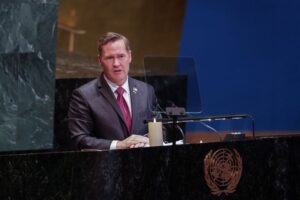
IN recent weeks, South Korea has witnessed a surge of anti-Trump sentiment.
The controversy over tariff negotiations with Washington, along with the shocking detention of Korean workers in Georgia, has triggered waves of anger.
Protesters in the country have shouted anti-American slogans, and some public figures have openly insulted US president Donald Trump. Such reactions may feel cathartic, but they are not solutions. Shouting slogans is an outlet for frustration, not a strategy for change.
There is no denying that Trump‘s policies have shaken the Korea-US alliance.
His approach has introduced serious tensions and raised questions about the future of bilateral relations. But venting anger at Trump will not resolve the crisis because his kind of common sense and rationality is totally different from ours.
It is also misleading to treat Trump as the root cause of our current predicament in South Korea. Rather, he has exploited accumulated frustration and resentment bred by deeper forces.
Trump is a political entrepreneur who has ridden a wave of discontent to build his own power. Where did the anger come from in the first place? The answer is simple: It came from the side effects of neoliberalism introduced several decades ago. Trump himself is not the architect of these problems, but a prisoner of them.
To be fair, neoliberalism has not been an unmitigated failure. It has produced striking successes.
After the end of the Cold War in 1991, many countries embraced neoliberal reforms and enjoyed extraordinary growth. Globalisation expanded the volume of trade, increased the amount of wealth, and spurred technological innovation.
According to the World Bank, the proportion of people living in extreme poverty fell from nearly 36% in 1990 to less than 10% by 2015. These achievements must not be forgotten.
Yet alongside progress came peril. By prioritising deregulation and market supremacy, neoliberalism magnified inequality and unfairness. Some businesspeople in certain countries have raked in money, while others have felt deprived of their fair share.
In common parlance, “the rich got richer and the poor got poorer.” Justice was sidelined, and fairness eroded. This inequality quickly translated into social polarization, fracturing societies and inevitably spilling over into politics.
Anger born of inequality fuelled populism and extremism, as leaders across continents thrived by channelling resentment against the establishment.
At the same time, economic power increasingly dominated political processes. Multinational corporations and concentrated capital captured governments, bending regulations and policies to their advantage.
The result was a hollowing out of democracy: institutions weakened, consensus politics collapsed and trust in governance eroded. The final outcome is a global existential crisis.
Neoliberalism, obsessed with growth and efficiency, consistently ignored environmental costs. Climate change, ecological destruction and biodiversity collapse are the results.
Given this reality, the path forward is clear. South Korea, and the world at large, must stop fixating on Trump as the enemy. Instead, we must confront the failures of neoliberalism.
Emotional attacks on Trump achieve nothing. What is required is serious discussion, careful debate and effective policies to reduce neoliberalism’s damage while preserving its achievements.
What might those remedies look like?
Economically, we must reform taxation and trade policies, including tariffs where necessary, and fiscal policies to reduce inequality and rebuild fairness in markets. Socially, we must normalise welfare systems and protect labour rights to secure dignity for workers. We need an improved version of the immigration system. Politically, we must restrain the excessive influence of capital over governance and rebuild faith in democracy.
South Korea is well-positioned to contribute. This nation has firsthand experience with both sides of neoliberalism. We benefited from rapid growth through globalisation, but we also endured the pain of the 1997 IMF financial crisis and the 2008 global financial meltdown.
Ordinary citizens carried the heaviest burdens, from mass layoffs to lost savings. This dual experience – prosperity and vulnerability – gives Korea a unique voice in today’s debate.
If South Korea can present a credible blueprint for mitigating neoliberalism’s side effects, backed by concrete reforms and moral conviction, we can turn crisis into opportunity. For instance, if Seoul is successful in reforming taxation and tariffs and creating an affordable immigration system, it can demonstrate that alternatives are possible. Such policies would not only benefit Koreans but also offer a model to other nations grappling with similar dilemmas.
Paradoxically, this kind of leadership could even create space for cooperation with Trump. If South Korea emphasises structural remedies rather than emotional quarrels, Washington may find common ground.
Trump thrives on conflict, but he is also a politician who responds to tangible success. He might anticipate that he is going to face backfires of his policies, including tariffs. If Seoul demonstrates effective alternatives, the US administration may conclude that cooperation is worthwhile.
The real challenge, then, is not to battle Trump as he is obsessed with the misconception that the US has been exploited by allies and friends. It is better to address the underlying system that produced both him and the anger he represents. Neoliberalism’s excesses have destabilised economies, divided societies, weakened democracies and endangered the planet. Fighting Trump may deliver momentary satisfaction, but it does nothing to resolve those deeper crises.
What South Korea should do now is clear. We must stop wasting energy on denouncing Trump and instead focus on building remedies to neoliberalism’s failures. We must propose, debate and implement solutions – and in doing so, set an example for others. If South Korea can act as a pioneer in reducing inequality, rebuilding social safety nets and protecting democracy, our diplomacy will gain new stature.
The choice is before us. Either we engage in endless blame games with populist leaders, or we confront the structural forces that made those leaders possible.
The wiser course is to face neoliberalism’s failures head-on – without denying its past achievements. If we do, we will not only guard ourselves against further crises but also create new opportunities for cooperation, even with those who once seemed like adversaries. — The Korea Herald/ANN
Wang Son-Taek is an adjunct professor at Sogang University.






